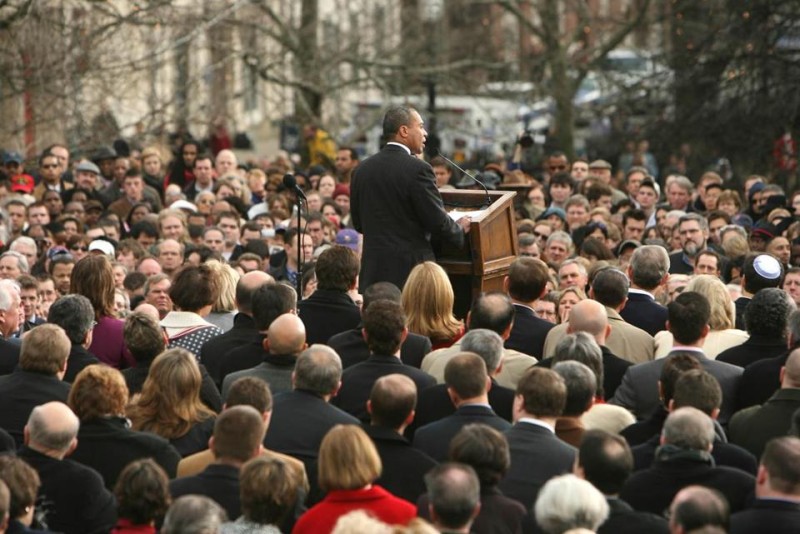Deval Patrick looked out on Boston Common, presiding not only as the incoming governor but as the leader of a movement that had upended politics. Thousands from across the state cheered and held up cellphone cameras — people of every kind and color, young and old, jubilant multitudes never before seen at the State House.
At his first inauguration under uncommonly fair skies in January 2007, the man who a year earlier had been dismissed as a hopeless romantic with no chance of victory carried with him limitless hope for the future — for better schools, fairer housing, racial healing.
“It’s time for a change,” Patrick declared, “and we are that change.”
Over the next eight years, Patrick delivered on some of those hopes: securing reforms in transportation, education, and ethics, and launching initiatives that stimulated the clean energy and biotechnology industries. He legalized casinos, surprising and disappointing supporters, and was besieged by management problems in health care, child welfare, and unemployment benefits that bruised the faith in government he was determined to restore.
As he prepares to leave office, Patrick leaves behind a deep imprint on the judiciary, where he has appointed more than 40 percent of the state’s judges, including five of the seven justices of the Supreme Judicial Court. His influence can also be felt in the halls of power, where a loyal network of former aides now hold high positions in the corporate, lobbying, and nonprofit worlds. But he has also alienated many of his allies in the Legislature, who say Patrick frustrated them with a style that was sometimes highhanded and tone deaf.
“He was absolutely phenomenal in terms of the broad themes,” said Representative David Linsky, a Natick Democrat who worked with Patrick on criminal justice issues. “When I think about where the Commonwealth was eight years ago and where it is now, we’re in great shape in a lot of ways. The failings were in the nitty-gritty of running the state. The problem has been in the basic administration of government.”
The hopes for a new era in state politics — never higher than on inauguration day — were challenged right from the start of his first term when Patrick made good on his promise to bring outsiders into the insiders’ club that is the Massachusetts State House.
The new governor and his politically inexperienced team spent their first three months lurching from crisis to crisis — over the costly new drapes in his office, the upgrading of his official car to a Cadillac, his phone call to vouch for a controversial subprime mortgage lender.
After overhauling his staff, bringing in the kind of seasoned hands he had initially shunned, Patrick regained his footing, scoring a series of legislative victories at the end of his first term. Among those was a bill he championed that expanded the number of charter schools in exchange for $250 million in federal funding from the Obama administration. Rebounding from low poll numbers, he won reelection in 2010, after a campaign that reintroduced voters to his soaring oratory. Days later, he declared he would not seek a third term, making himself a lame duck with more than four years left in office.
Now, as he nears the end of his turbulent turn in office, Patrick says he is eager to take a “long, warm-weather nap” and rejoin the private sector. He remains a historic figure, the first African-American governor in a state with a painful history of racial conflict.
Yet many of his accomplishments have been overshadowed by the management problems that flared in his final years in office, when he also looked overseas for traction, traveling on trade missions.
He has openly contemplated a presidential campaign — maybe after 2016, he says. If he were to run on a national stage, each action he has taken over the past years would be analyzed and scrutinized, and the inevitable tension between his lyrical rhetoric and concrete actions measured and debated. The picture of Patrick’s legacy that emerged would probably be much more complex than he envisioned that first day overlooking the Common, with some promises fulfilled but others slashed or reshaped by the recession and his rocky relationship with legislators.
“He never got comfortable with those relationships,” said Daniel O’Connell, who was Patrick’s housing and economic development secretary from 2007 to 2009. “The manual wasn’t there in the governor’s office for how you navigate the Legislature, and that was frustrating, and got more frustrating over time.”
Patrick said he is proud of his record — on the economy, education, and infrastructure — but surprised by how difficult it was to persuade legislators to agree with him.
“I thought substance would be as important — maybe more important — than the performance art part of it,” he said in an interview. “The job really is a blend of the two. And if you get the substance right, but the performance art wrong, or off-key in some way, it’s really hard to get to the substance. And that’s a tough, tough lesson for me.”
Even though he now knows the players at the State House and considers some of them friends after eight years, he said, “I still get treated like an outsider.”
